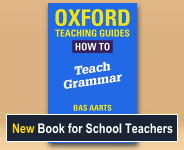Attitudes to new modes
In this lesson, students will explore new modes of communication such as texting, online chat, and Facebook, which often come in for criticism from people who believe that they are damaging the way we use language.
Goals
- Read, analyse, and evaluate some viewpoints on new modes.
- Discuss some key questions in the acceptability of new modes.
Lesson Plan
The teacher explains that today, we will explore descriptive and prescriptive views of linguistics, in relation to new modes of communication.
Here are some common complaints about online language:
- It is full of spelling and grammar errors.
- It is heavily abbreviated.
- It doesn’t make sense.
- It is damaging English and becoming a bad influence on people’s language in other forms.
Opinions like these are often described as belonging to a prescriptive view. People who take a prescriptive view of language often tell us how they think we should talk or write. An opposing view is often described as a descriptive view: this involves not passing judgements about language use, but analysing and describing it instead. It’s probably fair to say that most linguists (people who study language) are inclined to be descriptivists.
To explore this in more detail, this resource will look at short examples of different opinions about language use and abuse. To help students get to grips with the different views, they will consider a continuum between extremely prescriptive at one end and extremely descriptive at the other end.
The Activity page can be found by clicking on 'Activity' in the bottom right corner of this page. In the slides in the Activity page, a number of quotes about language use appear. Students can use the slider below each extract to place the quote on a continuum between descriptive and prescriptive.
Finally, invite students to discuss where they stand in relation to each quote, and on a continuum between prescriptive and descriptive views. Consider the following questions:
- Is the English language getting worse over time? How can we know?
- Is text language ruining English?
- Should we try to control or regulate the English language? How and why?
- What is the role of register and context in these debates? Are some features of English acceptable, but only in some contexts?
- What would happen if we spoke like textbooks? What would happen if we wrote textbooks the way we speak with friends in the park? How does context determine acceptability?
Further Discussion
Notice the term code switching used in Slide 2. What does this mean? What is Tony Thorne suggesting here? Code switching is the way that speakers sometimes switch from one language, dialect or variety to another, according to the demands of the situation. Here Tony Thorne is suggesting that kids who use slang abbreviations are generally able to switch between a more informal variety and a more formal variety, depending on the context.
Welcome!

Englicious is totally free for everyone to use!
But in exchange, we ask that you register for an account on our site.
If you’ve already registered, you can log in straight away.
Since this is your first visit today, you can see this page by clicking the button below.
- Printer-friendly version
- Log in to view or leave comments

